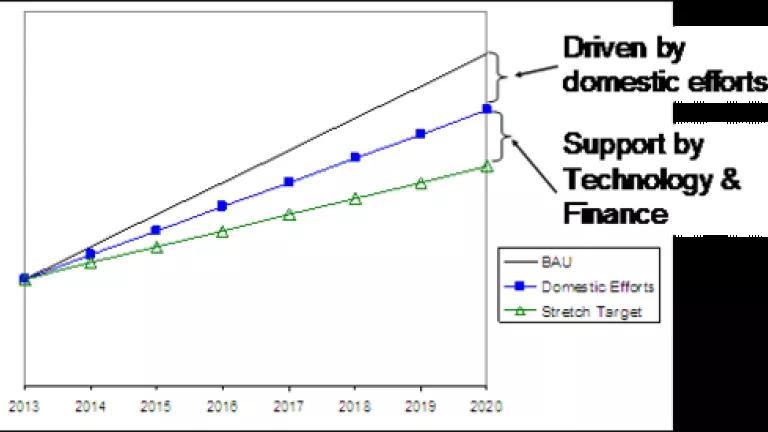
Andy Revkin has a DotEarth post on: Can U.S., China Team Up on Climate, Energy? Well he didn't exactly ask it directly of me, but I'll take the liberty of responding. The answer is YES and also that THEY MUST.
I think it is a very good sign that folks in the inner circle of President-elect Obama are signaling that they will make the US-China portion of the global warming challenge a top priority. After all, these two countries combined account for around 40% of CO2 emissions from fuel combustion and over a third of energy consumption in the world. So "cracking that nut" is probably close to 60% of the challenge of getting a strong global agreement in Copenhagen (the remainder being made up of the targets of the other developed countries, followed closely by deforestation reductions and reductions in other emerging economies), which I discussed in: My Resolution to Help "Green the Planet" this Year: Get an International Climate Agreement.
So that is why NRDC and a group of other environmental NGOs recommended in our transition recommendations that we "beef up" our energy and environment dialogue with China (with more than just words but deeds). Luckily there is an existing dialogue -- the US-China Ten Year Framework on Energy and Environment -- that creates a strong forum for action. Now all it needs is a President that utilizes it to begin serious discussions between the US and China on global warming (which we now have with President-elect Obama). For more details see my post on Detailed Actions to Restore America's Global Leadership on Global Warming.
I think sectoral approaches offer a huge promise as a part of this China and US dynamic (as I discussed how the international debate can Evolve from "Offsets" to Sectoral Approaches for Developing Countries based upon a soon to be released report. In fact, this approach has garnered significant interest in the international climate negotiations and even China signaled a strong "openness" to engage in this approach in the post-2012 agreement as they signaled at the climate negotiations in Ghana in August 2008 when countries Started to Read from the Same Book on Sectoral Approaches for Developing Countries.
Under this approach, each of the emerging economies would negotiate agreed-upon "stretch targets" on a sectoral basis for key sectors -- such as electricity and energy-intensive industries. The initial effort -- the "domestic effort" -- would be financed with internal resources and the remaining reduction would be financed through international assistance (see Figure).
However, I think someone gave Andy Revkin some bum advice when they suggested:
"Chances of a broader, deeper set of mandatory targets for cutting the gases are very low, by many accounts. Chances are much higher for countries to agree to cooperate on a menu of climate-friendly initiatives, say, within particular sectors like electricity generation or manufacturing aluminum."
YES, BUT...
There is a growing agreement that a sectoral approach for electricity and major industries is an attractive approach, but these are only seriously being discussed for major emerging economies -- NOT DEVELOPED COUNTRIES. The developed countries have continued to agree that these approaches won't replace hard economy-wide targets in their economies as they agreed in Ghana and since (see my post on sectoral approaches from Ghana which discusses these points). So while sectoral approaches are a serious option for the post-2012 international climate negotiations, and I think need to be a strong part of the US-China dialogue on global warming, they are more the strategy for how China will reduce its global warming pollution (but not a strategy that the US will undertake as a replacement for hard economy-wide targets). The US is likely to negotiate with China around this approach and China will likely argue for technology and financial assistance to help support a sectoral agreement so there is a strong role for a US-China agreement on this approach.
So promising signs that the new Administration will make engagement with China on global warming one of their top priorities and it appears that sectoral approaches will be a key part of that negotiation.

